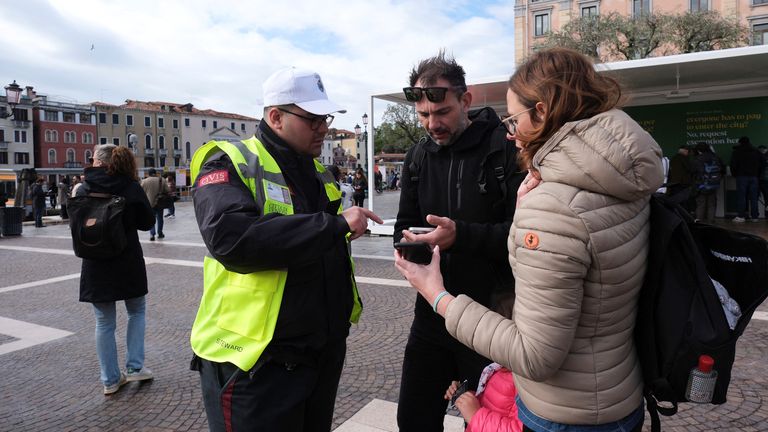Officials in Venice are considering doubling the daily tourist tax following a lucrative summer trial.
Over a 29-day period in the summer, the city collected €2.4m (£2m) from the €5 (£4.20) tax paid 485,062 times.
The trial took place between 25th April and 14th July and only applied to day-trippers.
During the trial, Italians made up 60% of Venice visitors, followed by US, German, and French tourists, ranging from 6.5% to 4% of the total.
City officials are now considering extending the tax next year and possibly doubling it to €10 on certain days.
However, a final decision will be made in autumn after a thorough data analysis.
Mayor Luigi Brugnaro mentioned the possibility of adjusting the fee based on advance payments.
He defended the tax against criticism that it did not deter arrivals as intended when first introduced.
Mr. Brugnaro stated: “We explored various alternatives but found that our solution was the most effective.”
“Our approach involved light and non-invasive checks,” he added.
Visitors not staying in city accommodations had to download a QR code to confirm tax payment.
On average, the payment process took approximately two minutes.
Explore more articles from Sky News:
Insight: Hello Kitty’s creators reveal she’s not a cat
Global chaos as mass IT outage disrupts travel and business
Fiery collision between two large oil tankers near Singapore
Hotel guests, already subject to lodging taxes, were exempt from the tourist levy, as were residents of the Veneto region, visitors under 14, and individuals visiting relatives, among others.
Authorities conducted random checks from 8:30 am to 4 pm, with violators facing fines ranging from €50 to €300 (£53 to £257).
Outside these hours, entry was free.
Venice is struggling with over-tourism, with an estimated 30 million annual visitors to the city.
The day-tripper tax was postponed due to the pandemic but was welcomed by UNESCO member states upon its introduction.
Simone Venturini, the city’s top tourism official, hailed the fee as “a significant shift in culture”.
“Venice now possesses a mechanism that provides precise, rather than approximate, estimates of visitor numbers, marking a pioneering step globally,” he explained.



